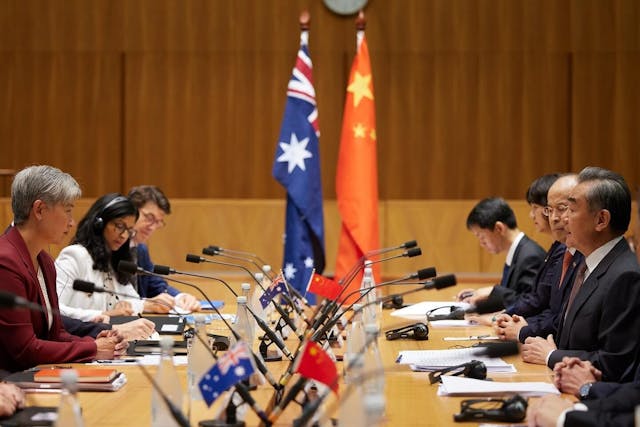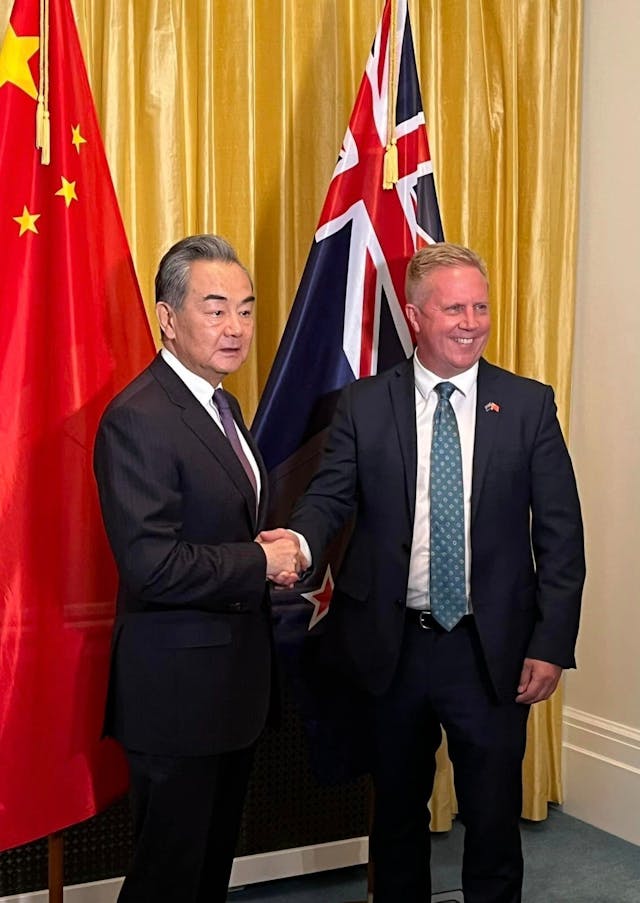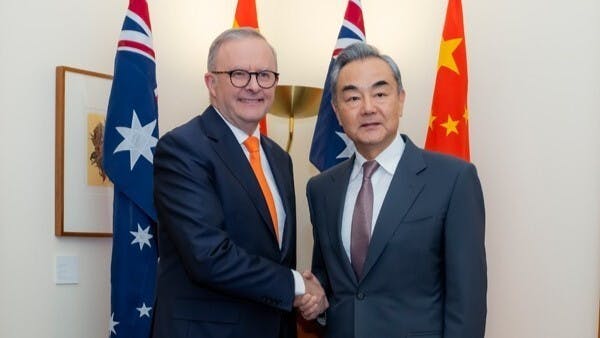中共中央政治局委員、中國外交部長王毅不久前訪問紐西蘭和澳洲,對中國與澳紐兩國關係以至亞太地區國際關係都有重要影響。
王毅:奉行獨立自主外交 不針對第三國
3月18日,王毅在惠靈頓會見紐西蘭貿易部長麥克萊。王毅表示,兩國秉持相互尊重、包容原則,聚焦合作、造福人民。此外,王毅表示,中國熱衷於與紐西蘭就升級後的自由貿易協定進行合作,並就貿易服務清單進行談判。王毅又表示,雙方應維護自由貿易,反對以「去風險」為名的單邊主義和保護主義,繼續開放世界經濟。
麥克萊回應,兩國雙邊合作成果豐碩,紐方願與中方在貿易、人員往來等領域合作。此外,紐西蘭堅持自由貿易原則,反對保護主義和單邊主義。
3月20日,王毅在坎培拉同澳洲外交部長黃英賢舉行第七次中澳外交與戰略對話。王毅表示,習近平主席2022年11月會見澳洲總理阿爾巴內塞時,雙方就加速改善雙邊關係達成共識。王毅補充說,兩國關係有起有落,但中國從不干預澳洲的內政。他說,在中國的主權、尊嚴和安全問題上,北京希望坎培拉尊重他們。
王毅也表示,雙方應追求雙贏,求同存異。王毅又說,澳洲近80%的貿易順差來自中國,因此,保護和促進共同利益應成為雙方的首要任務。王毅最後表示,中國奉行獨立自主的外交政策,不針對任何第三國。
王毅也在坎培拉會見了商界領袖和戰略精英,感謝他們促進友誼和貿易。他表示,中國高度重視維護和平、勸和促談,為世界和平穩定做出貢獻;中國也致力於推動兩國關係「重回正軌」,反對「單邊主義」和「霸凌行為」,敞開大門,營造市場化、法治化、國際化的環境。王說,歡迎澳洲人訪問中國。他呼籲雙方在貿易、金融、教育、衛生、氣候變化和科學研究等領域更加密切合作。

南海爭議不斷 試圖消弭擔憂
王毅對紐西蘭、澳洲的訪問具有政治意義。
首先,王毅此訪正值「中國威脅論」在新西蘭和澳洲部分戰略精英心中根深柢固之際,王毅的演講並重申中國是一個和平國家,重視中國的發展、雙邊合作、世界穩定及旨在平息此類「中國威脅論」的國際標準和法律。最近,中國與所羅門群島警方的合作引起了澳洲和紐西蘭的注意。此外,中國與菲律賓圍繞黃岩島主權的爭議也引起了一些國家的警惕。客觀地說,除非中國在海警和海軍活動上更加謹慎,否則西方對「中國威脅論」的看法不會輕易消失。在紐西蘭、澳洲部分戰略精英普遍抱着「中國威脅論」看法的情況下,王毅試圖消弭他們的擔憂,因此訪問具有政治意義。
其次,王毅此訪正值美國總統大選即將來臨的時候,出於對特朗普重返總統寶座的擔憂,各國的一些政治精英或許正在為美國可能回歸更加孤立主義、更加保護主義及高度不穩定和不可預測的立場做準備。儘管特朗普可能重新掌權,但美國對亞太地區的外交政策可能延續而不會變化,但王毅的訪問恰逢一些紐西蘭和澳洲的戰略和外交精英內心深處存在對美國外交政策不確定性和變化的隱憂。總之,王毅對紐西蘭和澳洲的訪問是及時且具有戰略意義的,或許引起了一些人對美國外交政策可能轉變的擔憂。王毅提到中國反對保護主義時,或許是那些擔心美國外交政策中實施特朗普主義的人們愈來愈認同的立場。
澳紐擔憂台海現況 王毅強調中國愛和平
第三,就在王毅訪華之前,澳洲作出了善意姿態,暫停了對中國風電塔實施的反傾銷措施,這些措施將於2024年4月16日到期。從外交角度來看,澳洲的這一姿態是明智的,因為黃英賢在會見王毅時巧妙地提出了人權記錄問題,包括澳洲作家楊恆均死刑緩期執行,以及新疆、西藏和香港的情況。事實上,王毅已經呼籲包括澳洲在內的外國不要干涉包括新疆、西藏和香港在內的中國內政。儘管如此,黃英賢還是坦率地與王毅談到了「在中國被拘留的澳洲人」,這是一個優先問題,反映出澳洲希望中國能夠以寬容和外交的方式處理楊恆均案。黃英賢在新聞發布會上表示,澳洲提出了「我們對海上不安全行為的嚴重關切,以及我們對台灣海峽和我們地區和平與穩定的渴望」。如果說自王毅出掌外交部以來,自信的中國民族主義是中國外交政策的特徵,那麼這種自信的民族主義或許也可以在澳洲方面看到,尤其是黃英賢與王毅討論的內容。
第四,如果說中澳關係存在着政治和意識形態價值觀的差異,那麼中國和紐西蘭的關係也存在着同樣的現象。3月18日,紐西蘭外交部長彼特斯在會見王毅時,表達了他對「人權、新疆、西藏和香港局勢,以及南海和台灣海峽緊張局勢加劇」的擔憂。紐西蘭和澳洲都不約而同或有意地提出了類似問題。作為傳統上低調的五眼聯盟成員,紐西蘭通常以沉默的方式向中方表達關切──或許從王毅這次紐西蘭之行也能看出這一點。
第五,紐西蘭和澳洲提出了對台海的擔憂,可以說他們正在觀察中國大陸將如何應對2024年5月20日之後賴清德領導的台灣新政府。包括美國、英國在內的各國戰略和外交精英也紛紛表達了這一觀點。 因此,王毅在訪問紐西蘭和澳洲時強調中國是一個和平國家,同時呼籲外國尊重中國的主權和內政,這是一種針對外國關切的先發制人的言論。然而,只要北京與台北的關係仍然動盪不安,台灣的政治未來問題就將成為包括紐西蘭和澳洲在內的美國亞太盟友持續關注的問題。

加強國家間對話 唯分歧根深柢固
總的來說,王毅對紐西蘭、澳洲的訪問具有重要的政治外交意義。這次訪問正值「中國威脅論」在美國盟友中根深柢固,兩國一些戰略精英對美國外交政策是否會隨着特朗普可能重返總統寶座的前景而再次改變表示懷疑。當澳洲在楊恆均案上作出善意姿態,希望中國採取互惠行動時,當中國與紐西蘭和澳洲之間意識形態價值的衝突仍然突出時,台灣的政治未來問題仍然是紐西蘭和澳洲領導人心中的一個擔憂。顯然,王毅此訪可以達到加強國家間對話、溝通與合作的目的,但由於深刻的意識形態和政治分歧,這種成功似乎遇到了進一步突破的巨大障礙。
Wang Yi’s visit to New Zealand and Australia
The recent visit of the Chinese Foreign Minister, Wang Yi, to New Zealand and Australia, has important implications for China’s relations with not only the two countries but also the international relations of the Asia-Pacific region.
On March 18, Wang Yi met New Zealand’s Minister for Trade Todd McClay in Wellington. Wang said that both countries adhered to the principles of mutual respect and inclusiveness, focusing on cooperation and benefiting the people. Moreover, China, according to Wang, is keen to work with New Zealand on their upgraded Free Trade Agreement and to negotiate over the list of trade services. Wang added that both sides should safeguard free trade, oppose unilateralism and protectionism in the name of “de-risking,” and continue to open the world economy.
In response, Todd McClay said that both countries had fruitful results in bilateral cooperation and that New Zealand is keen to work with China cooperatively in the areas of trade, personnel exchanges. Furthermore, New Zealand is upholding the principles of free trade and to resist protectionism and unilateralism.
On March 20, Wang Yi held the seventh China-Australia Foreign and Strategic Dialogue with Australian Foreign Minister Penny Wong in Canberra. Wang remarked that when President Xi Jinping met Prime Minister Anthony Albanese in November 2022, both sides reached consensus on the need to accelerate the improvement of bilateral relations. Wang added that both countries had ups and downs in their bilateral relations, but China never intervenes in Australia’s domestic affairs. On China’s sovereignty, dignity and security concerns, according to Wang, Beijing hopes that Canberra would respect them.
Wang also said that both sides should pursue a win-win situation, seeking common ground and shelving their differences. Almost 80 percent of Australia’s trade surplus comes from China, Wang added, and as such, the protection and advancement of common interests should be the priorities of both sides. Finally, Wang commented that China pursues an independent foreign policy without targeting at any third country.
Wang Yi also met the business and strategic elites in Canberra, thanking them for promoting friendship and trade. He elaborated that China attached great importance to maintaining peace, promoting talks that lead to peace, and contributing to peace and stability in the world. China also strives for “democracy” in international relations, opposes “unilateralism” and “bullying acts,” opens its door to the outside world, and fosters an environment governed by the market, law and the international standards. Australians are welcome to visit China, according to Wang. He appealed to both sides to cooperate more closely in the areas of trade, finance, education, health. climate change, and scientific research.
Wang Yi’s visit to New Zealand and Australia had political significance.
First and foremost, his visit took place at a time when the perception of “the China threat” remains deep-rooted among the psyche of some strategic elites in New Zealand and Australia, Wang Yi’s remarks and reiteration on China as a peaceful country attaching importance to bilateral cooperation, world stability and the international standards and law aimed at pacifying such fears of the “Chinese threat.” The cooperation between the police in China and that in the Solomon Islands has recently raised the eyebrows of Australia and New Zealand. Furthermore, China’s disputes with the Philippines over the sovereignty of Scarborough Shoal have already alarmed some countries. Objectively speaking, the western perception of the “China threat” is not going to fade away easily unless China exercises even more caution in its marine police and naval activities. Under the context of the prevalence of “the China threat” perception among some strategic elites in New Zealand and Australia, Wang Yi’s visit was politically significant, trying his best to calm down their fears.
Second, Wang Yi’s’ visit occurred at a time before the upcoming US presidential elections. With concerns about the possibility of Donald Trump’s return to presidential power, some strategic elites in different countries are perhaps preparing for a scenario in which the US will likely return to a more isolationist, more protectionist and highly erratic and unpredictable stance. Although continuities rather than changes would perhaps characterize US foreign policy toward the Asia-Pacific region even though Donald Trump would perhaps return to presidential power, Wang Yi’s visit coincided with the hidden concerns about the uncertain and fluctuating US foreign policy in the psyche of perhaps some strategic and diplomatic elites in New Zealand and Australia. In short, Wang Yi’s visits to New Zealand and Australia were timely and strategic, perhaps striking a chord with some concerns about possible shift in US foreign policy. When Wang mentioned China’s opposition to protectionism, it could perhaps be a position increasingly shared by those concerned about Trumpism in US foreign-policy implementation.
Third, just prior to Wang Yi’s visit, Australia made a gesture of goodwill by suspending trade remedy measures against Chinese wind towers when these measures would expire on April 16, 2024. The Australian gesture was a smart one, from a diplomatic perspective, because Penny Wong tactically raised the issue of human rights record during her meeting with Wang Yi, including the suspended death sentence on Australian writer Yang Hengjun, and the circumstances in Xinjiang, Tibet and Hong Kong. Indeed, Wang Yi had already appealed to foreign countries, including Australia, not to interfere with China’s domestic affairs, which cover Xinjiang, Tibet and Hong Kong. Still, Wong spoke to Wang frankly about “Australians detained in China,” a priority issue that reflected Australia’s desire that China would deal with the Yang case perhaps leniently and diplomatically. Penny Wong said in a press conference that Australia raised “our serious concern about unsafe conduct at sea, our desire for peace and stability in the Taiwan Strait, and in our region (The Guardian, March 19, 2024).” If assertive Chinese nationalism has characterized China’s foreign policy since the leadership of Foreign Minister Wang Yi, such assertive nationalism could perhaps be also seen in the Australian side, especially Penny Wong’s content of discussion with Wang.
Fourth, if differences in political and ideological values mark the Sino-Australian relations, the same phenomenon can be seen in the Sino-New Zealand relations. During the meeting with Wang Yi on March 18, New Zealand Foreign Minister Winston Peters raised his concerns about “human rights, the situation in Xinjiang, Tibet and Hong Kong, and the increased tensions in the South China Sea and the Taiwan Strait (Reuters, March 18, 2024).” Both New Zealand and Australia coincidentally or deliberately raised similar issues. As a traditionally low-profile member of the Five Eyes alliance, New Zealand usually voices its concerns to China in a silent manner – perhaps it could also be seen in Wang Yi’s visit to New Zealand.
Fifth, as New Zealand and Australia have raised their concerns about the Taiwan Strait, it can be said that they are now observing how mainland China will cope with the new government of Taiwan under the leadership of William Lai after May 20, 2024. Such concerns have also been expressed by strategic and diplomatic elites of different countries, including the United States and the United Kingdom. As such, Wang Yi’s emphasis on China as a peaceful country during his visit to New Zealand and Australia while appealing to foreign countries to respect China’s sovereignty and domestic affairs was a kind of preemptive remarks against such foreign concerns. Still, as long as Beijing-Taipei relations remain volatile and unstable, the question of Taiwan’s political future will become a constant concern among the US allies in the Asia-Pacific region, including New Zealand and Australia.
In conclusion, Wang Yi’s visits to New Zealand and Australia were politically and diplomatically significant. The visits came at a time when the “China threat” perception remains deep-rooted among the US allies, when some strategic elites in the two countries cast doubts on whether the US foreign policy would change again with the prospects of Donald Trump’s possible return to presidential power, when Australia made a goodwill gesture in the hope of a possible reciprocal move from China over the case of Yang Hengjun, when the clashes of ideological values remain prominent between China on the one hand and New Zealand and Australia on the other hand, and when the question of Taiwan’s political future remains a concern in the psyche of the New Zealand and Australian leadership. Obviously, Wang Yi’s visits could achieve the objective of enhancing dialogue, communications and cooperation with the two countries, but such success appears to encounter tremendous obstacles for further breakthrough mainly due to profound ideological and political differences.
原刊於澳門新聞通訊社(MNA)網站,本社獲作者授權轉載。原文網址:https://tinyurl.com/2a6r6sk7



































